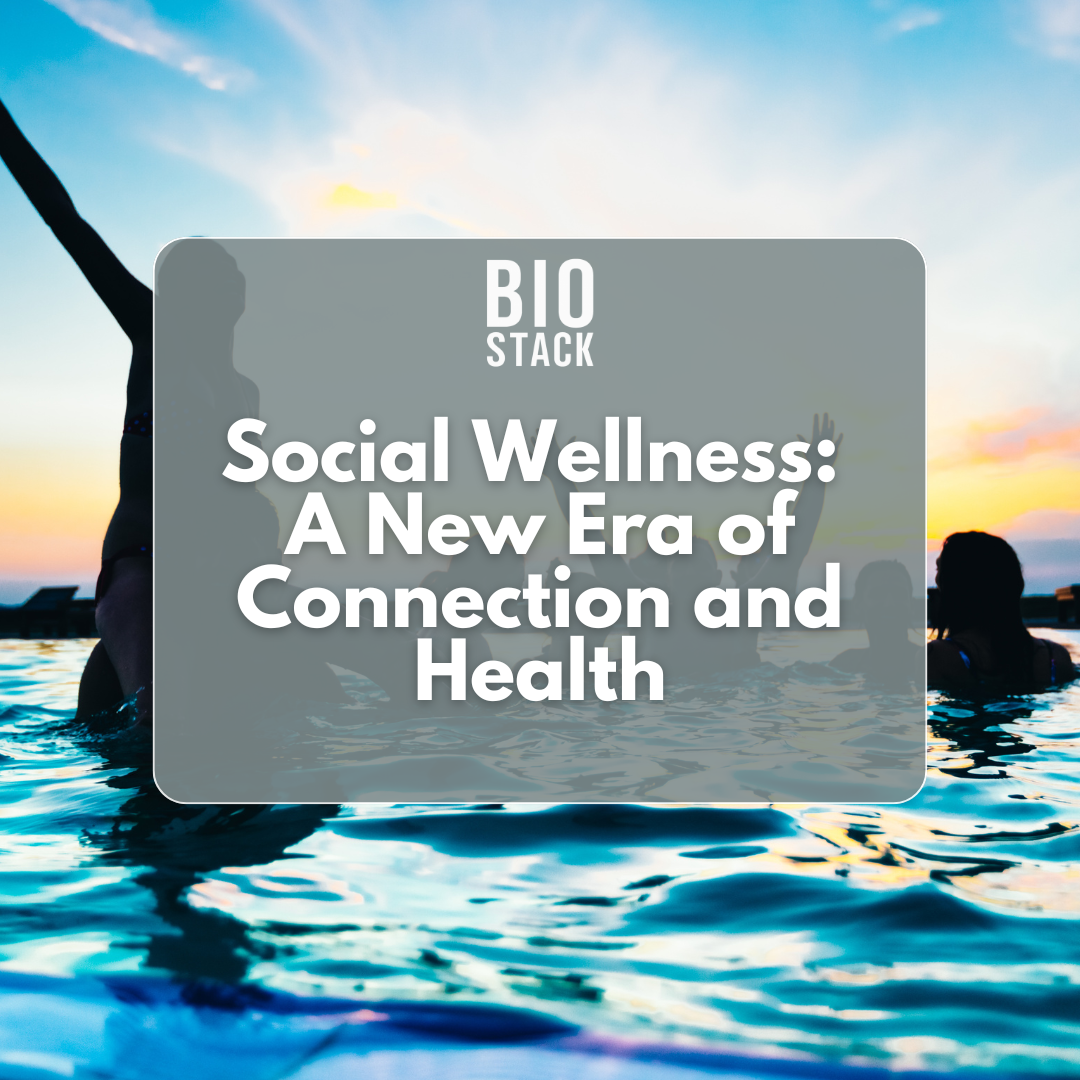
Social Wellness: A New Era of Connection and Health
Share
Social Wellness: A New Era of Connection and Health
The days of isolated self-care routines are being replaced by a collective approach to wellness: one that emphasizes connection, community, and shared experiences. This phenomenon, often referred to as "social wellness," is reshaping how people prioritize their health and create meaningful relationships.
At the heart of this movement is a growing trend towards experiences that nurture both physical and mental well-being while fostering deeper social bonds. From alcohol-free gatherings to sauna sessions, cold plunges, sound baths, and more, social wellness is not only about self-care but also about connecting with others in an environment that promotes holistic health.
The Shift Away From Alcohol
One of the most significant markers of the social wellness trend is the shift away from alcohol. For decades, socializing often revolved around drinking – whether at bars, parties, or celebratory events. However, a growing awareness of the adverse effects of alcohol on physical and mental health has led to a rise in alcohol-free alternatives.
Millennials and Gen Z, in particular, are leading this change. These generations are increasingly health-conscious, valuing experiences that enhance their well-being without compromising their goals. The emergence of sober-curious movements, alcohol-free pop-ups, and non-alcoholic beverages reflects this shift. Brands like Seedlip and Kin Euphorics have capitalized on this trend, creating sophisticated non-alcoholic drinks that cater to those seeking to enjoy a night out without the hangover.
Social gatherings are no longer defined by alcohol consumption. Instead, they’re becoming opportunities to connect through activities that enhance well-being. This might mean meeting friends for a yoga class, a meditation circle, or even a mocktail-making workshop. By removing alcohol from the equation, these interactions become more mindful, intentional, and health-focused.
Sauna Sessions and Cold Plunges
Few wellness practices embody the spirit of social wellness as effectively as sauna sessions and cold plunges. Once seen as solitary activities, these ancient practices are being revitalized in modern, communal settings.
Infrared saunas and traditional Finnish sauna experiences have become popular hubs for people seeking detoxification, relaxation, and connection. Groups of friends or wellness enthusiasts often gather in saunas to sweat out stress while engaging in meaningful conversations. Many wellness centers now offer sauna spaces designed for socializing, complete with cozy seating areas and refreshments to encourage lingering chats after a session.
Cold plunges, on the other hand, are fast becoming the social wellness activity of choice for thrill-seekers and biohackers alike. These invigorating dips into icy water provide a host of health benefits, from reducing inflammation to boosting endorphins and mental clarity. But beyond the physical perks, cold plunges create a unique bonding experience.
Whether braving an ice bath together or plunging into a natural body of water, these activities foster a sense of camaraderie. The shared challenge of enduring the cold can break down barriers and create a sense of unity. It’s not uncommon to see groups cheering each other on, laughing through the discomfort, and emerging from the water feeling rejuvenated and more connected than ever.
Sound Baths and Mindful Gatherings
Sound baths, once a niche wellness practice, have surged in popularity as an accessible and transformative form of relaxation. Combining sound therapy with mindfulness, these sessions use vibrations from instruments like crystal bowls, gongs, and chimes to promote deep relaxation and stress relief.
What makes sound baths particularly appealing in the social wellness space is their communal nature. Participants gather in serene environments, often lying side by side, as they immerse themselves in the soothing sounds. The shared stillness creates a profound sense of connection, even in silence. Many people find that attending sound baths with friends or loved ones deepens their relationships, as they share the calming experience together.
Beyond sound baths, other mindful gatherings are gaining traction. Group meditations, breathwork circles, and gratitude practices offer opportunities to prioritize mental health in a supportive setting. These activities help participants feel seen and heard, creating a sense of belonging that’s often missing in today’s digital-first world.
Social Wellness as the New Social Currency
Social wellness is not just about the activities themselves; it’s also about redefining how we connect with others. Traditional socializing often prioritizes consumption—whether that’s food, drink, or entertainment. In contrast, social wellness focuses on shared experiences that enrich our lives and promote growth.
Wellness-focused activities create a space for authenticity. Without the distractions of alcohol or superficial conversations, people are more likely to engage in meaningful interactions. Whether it’s bonding over the challenge of a cold plunge, reflecting together during a sound bath, or simply enjoying the quiet intimacy of a sauna session, these experiences foster deeper connections.
Moreover, social wellness aligns with the growing desire for intentional living. As people seek balance in their busy lives, they’re drawn to experiences that offer both self-care and community. Wellness retreats, boutique fitness classes, and wellness-focused coworking spaces are just a few examples of how this trend is manifesting.
Wellness with Friends: The Ultimate Health Hack
Perhaps the most compelling aspect of social wellness is its ability to combine health benefits with the joy of human connection. Studies consistently show that strong social ties contribute to better physical and mental health. People with close relationships are more likely to exercise regularly, eat healthier, and maintain better emotional well-being.
By bringing friends into wellness routines, people are not only enhancing their own health but also strengthening their relationships. Whether it’s a weekend hike, a group workout, or a sound bath session, these shared activities become anchors for connection and accountability.
The ripple effects of this approach are profound. Wellness is no longer a solitary endeavor; it becomes a collective journey that inspires, motivates, and uplifts everyone involved.
The Rise of Wellness Communities
Social wellness has also given birth to wellness communities. These are spaces where like-minded individuals come together to explore health and well-being in a supportive environment. From yoga studios and meditation centers to online wellness platforms, these communities offer a sense of belonging that’s increasingly rare in the modern world.
For many, these communities provide the structure and encouragement needed to prioritize wellness. They offer accountability partners, shared resources, and a network of people who understand the challenges and rewards of pursuing a healthy lifestyle.
Social media has played a significant role in amplifying this trend. Platforms like Instagram and TikTok are filled with wellness influencers sharing their journeys, from cold plunge adventures to sound bath sessions. These digital spaces allow people to connect, learn, and draw inspiration from others, even if they can’t physically attend the same events.
A Future of Connection and Health
The rise of social wellness signals a broader cultural shift towards prioritizing health in a way that feels sustainable, joyful, and connected. By focusing on activities that nurture both the individual and the collective, people are redefining what it means to live well.
As more people embrace alcohol-free gatherings, sauna and cold plunge sessions, sound baths, and other wellness-focused experiences, the boundaries between socializing and self-care continue to blur. This evolution not only enhances physical and mental health but also creates a stronger sense of community and belonging.
In a world that often feels fragmented, social wellness offers a powerful antidote. It reminds us that health is not just about the body but also about the relationships we cultivate and the moments we share. Whether it’s laughing through an ice bath with friends, finding stillness in a sound bath, or simply showing up for a yoga class together, these experiences bring us closer to each other and to ourselves.
The era of social wellness has arrived, and it’s redefining how we live, connect, and thrive.
